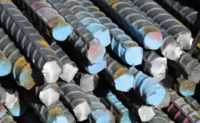If President Trump adopts Commerce Dept. recommendations to impose severe trade penalties on steel and aluminum imports from China and other foreign countries, prices for construction steel and aluminum products would jump and some contractors could suffer a financial blow, industry economists predict.
The proposals—which Commerce sent to President Trump on Jan. 11 but didn’t release publicly until Feb. 16—include two that would apply to steel imports from all countries: a tariff of at least 24% and a quota that equals 63% of each country’s 2017 steel exports to the U.S. [View Commerce's steel report here.]
Two other options would apply to steel imports from China, Brazil, India, Korea, Russia and seven other countries—a minimum tariff of 53% and a quota equaling 100% of their 2017 steel exports to the U.S.
Commerce said it was recommending “immediate action” on steel and aluminum but noted that it will be up to Trump to decide which of the options to put in place. He also may choose not to take any action or exempt exports from specific countries from the tariffs or quotas.
Ken Simonson, Associated General Contractors of America chief economist, said via email that AGC officials "are hopeful he will recognize this could make infrastructure less affordable, foil efforts to rev up economic growth and imperil the financial health of contractor who have fixed-price contracts but have not locked in steel purchase prices.”
Simonson noted that for 2017, the Bureau of Labor Statistics producer-price index for steel mill products climbed 7.8% and the aluminum mill shapes index was up 9.4%. He said, “These tariffs would doubtless add double-digits to those rates of price increase.”
Anirban Basu, Associated Builders and Contractors chief economist, says Trump is likely to approve trade penalties in the steel and aluminum sector, noting that the administration has taken action against softwood lumber imports from Canada.
Basu says that the construction industry "is staring down the barrel of fairly significant increases in materials prices at a time when materials prices are already rising quite rapidly"
He also notes that many projects are planned and work scheduled, "and increases in steel or aluminum prices would in many cases come at the expense of the contractor."
Some contractors buy steel on the spot market, and others use futures contracts to lock in steel prices, Basunotes. But such contracts "can be expensive," and some firms choose to hold off on materials purchases, he adds. "But now is not the time to wait. Now probably is a good time to lock in prices, because the future has become very uncertain."
Simonson and Basu say that targeted countries may retaliate with similar penalties on U.S. shipments. Simonson said, “That is a big risk and something that typically happens.” Retaliatory tariffs would pose severe harm to warehousing, transportation and port-related companies and, in turn, reduce demand for construction, he said.
Overall, Basu says, the construction industry "stands to be among the biggest losers" among U.S. business sectors if the steel and aluminum tariffs and quotas are approved.
April deadlines
The president must issue a decision on the steel recommendations by April 11 and on the aluminum recommendations by April 19.
In its report, Commerce said that steel imports to the U.S. rose last year to an annualized rate of 36 million metric tons, from an annual average of 31.8 million over the 2011-2016 period.
The department’s report was prepared under Section 232 of the 1962 Trade Expansion Act and determined that steel and aluminum imports “threaten to impair the national security.”
Commerce also said that the actions are aimed at raising U.S. steel production to about 80% of capacity, from 73% now.
Any tariffs or quotas that Trump might endorse would be in addition to penalties that are now in effect.
Aluminum tariffs proposed
The aluminum recommendations were more moderate, including a worldwide tariff of at least 7.7% or a quota equaling up to 86.7% of an individual country’s’ 2017 exports to the U.S.
Other aluminum options include a 23.6% tariff on products shipped from China, Hong Kong, Russia, Venezuela and Vietnam; plus a quota.
The public version of Commerce’s report had “classified and business confidential information” redacted, the department said.
Thomas J. Gibson, American Iron and Steel Institute president and CEO, said in a statement, “We are grateful that the Commerce Dept. has found that global steel overcapacity and the resulting surge of foreign steel imports is threatening our national security. We look forward to continuing to work with the administration to address this critical situation. “
Union seeks Canada exemption
Leo W. Gerard, international president of the United Steelworkers’ union, praised the Commerce Dept. recommendations. Gerard noted that the report identified the countries that “have relentlessly violated trade laws.”
He added, “Curtailing that cheating and restoring fair market prices will go a long way to reigniting domestic production and employment.”
But the steelworkers also want to see imports from Canada exempted from possible tariffs or quotas. Ken Neumann, the union’s national director for Canada, said, “There is no justification to include Canada with countries that systematically violate trade laws and engage in the dumping of illegally subsidized aluminum and steel.”
Senate Minority Leader Chuck Schumer (D-N.Y.) said in a statement that he hopes that the recommendations “are the beginning of efforts by this administration to finally get tough on China and help level the playing field for American steel and aluminum producers and workers.”



